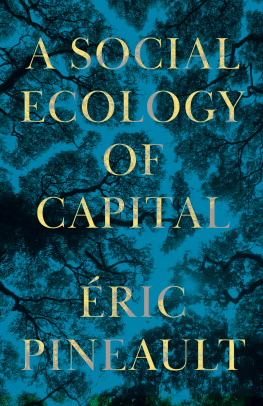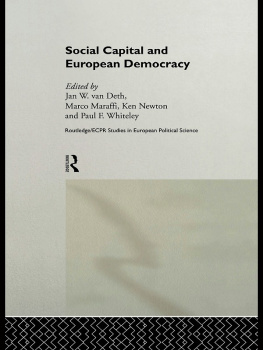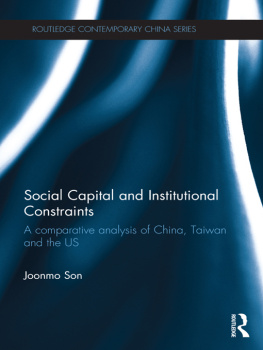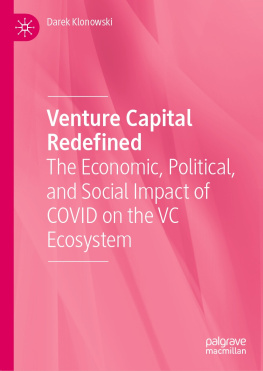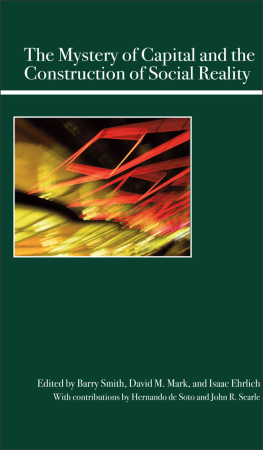Contents
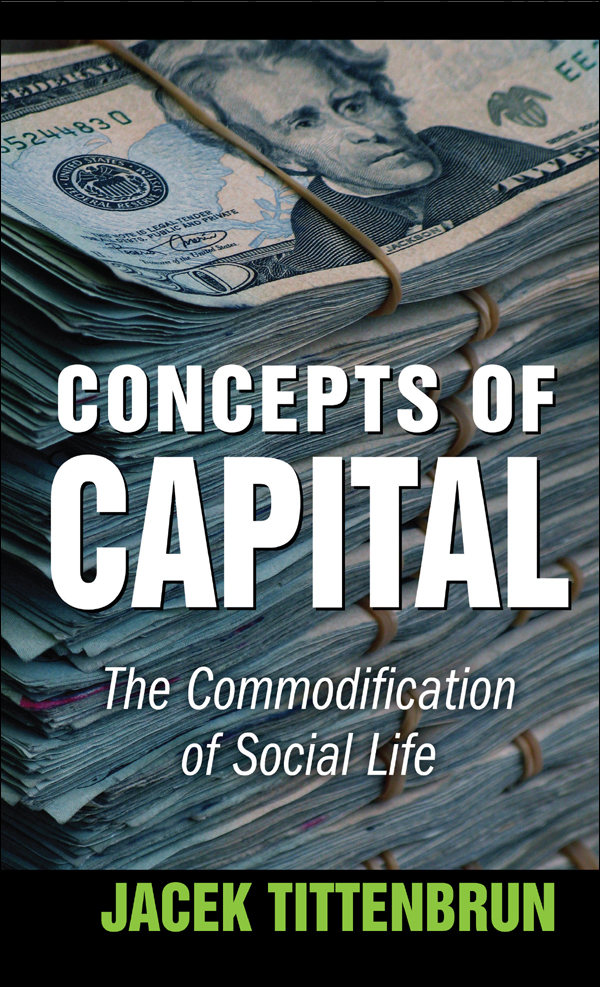
CONCEPTS OF
CAPITAL
CONCEPTS OF
CAPITAL
The Commodification
of Social Life
JACEK TITTENBRUN

First published 2014 by Transaction Publishers
Published 2017 by Routledge
2 Park Square, Milton Park, Abingdon, Oxon OX14 4RN
711 Third Avenue, New York, NY 10017, USA
Routledge is an imprint of the Taylor & Francis Group, an informa business
Copyright 2014 by Taylor & Francis.
All rights reserved. No part of this book may be reprinted or reproduced or utilised in any form or by any electronic, mechanical, or other means, now known or hereafter invented, including photocopying and recording, or in any information storage or retrieval system, without permission in writing from the publishers.
Notice:
Product or corporate names may be trademarks or registered trademarks, and are used only for identification and explanation without intent to infringe.
Library of Congress Catalog Number: 2013029958
Library of Congress Cataloging-in-Publication Data
Tittenbrun, Jacek.
Concepts of capital : the commodification of social life / Jacek Tittenbrun.
pages cm
1. Human capital. 2. Social capital (Sociology) 3. Commodification. I. Title.
HD4904.7.T533 2014
330--dc23
2013029958
ISBN 13: 978-1-4128-5302-6 (hbk)
Numquam ponenda est pluralitas sine necessitate.
(Plurality must never be posited without necessity.)
William of Ockham, theological work on
The Sentences of Peter Lombard
Contents
The title of this book encapsulates what is, at least in the authors judgment, unique about itits Janus-headed face, as it were. Normally, one has to do with projects that aim to capture just one of the dimensions involved; there are some studies dealing with the real world, and alongside there are also other works concerned with the ideational facets of reality. Meanwhile, the present study is concerned with some social science problems, but at the same time, it goes beyond that to include what is believed to underpin those ideational developments in the real world. To reiterate, while there are certainly publications on either of the aforementioned dimensions, to our knowledge there is no publication that combines the two. This is not the end of the story however, as the author believes there is much more that is innovative about his book than that. The said conceptual problems stem from the incredible popularity of a range of concepts with different adjunct, but sharing a common corecapital. There is indeed a bewildering diversity of such capitals deployed by a wide variety of social sciences. Anything like a full or even comprehensive overview of those constructs is beyond the purview of the present study. And such a detailed discussion is in fact not required for our present purposes; rather, we concentrate on the spread of the concept of capital from one field of inquiry to another, some grounds for which development will be sought in the somewhat parallel processes present in the real world.
Notes
. The interested reader should, however, consult Tittenbrun (2013) and the present authors forthcoming A Critical Handbook of Capitals Mushrooming across the Social Sciences, to be published by Lambert Academic Publishing.
Before turning to the main subject of this work, we need to elucidate one key concept that will be our principal research tool throughout the study. At the very outset, a key distinction between legal or juristic on the one hand and socioeconomic approach to property on the other should be outlined.
It is in these terms that Marx proceeds in Capital (1867/1976), using a number of examples from modern capitalism, albeit it has to be stressed that the basic nature of economic ownership is universal, that is, it is present in other economic formations of society as well. This is, incidentally, emphasized by Marx in, among others, the following statement:
The soil (and this, economically speaking, includes water) in the virgin state in which it supplies man with necessaries or the means of subsistence ready to hand, exists independently of him, and is the universal subject of human labour. All those things which labour merely separates from immediate connexion with their environment, are subjects of labour spontaneously provided by Nature. Such are fish which we catch and take from their element, water, timber which we fell in the virgin forest, and ores which we extract from their veins. (1867/1976)
It is true that this extraction of ores, coal, crude oil and other mineral deposits always requires some expenditure of human labor power. But can even the greatest effort of a worker equate with millions of years required for the natural processes to produce these forms of wealth? If the crucial aspect of economic property is apparent in the case of even transhistorically understood work, the more this is the case in the most developed system of production and labor, including exploitation of nature itself, as Marx in Capital points out
that the productive forces resulting from co-operation and division of labour cost capital nothing. They are natural forces of social labour. So also physical forces, like steam, water, &c., when appropriated to productive processes, cost nothing. But just as a man requires lungs to breathe with, so he requires something that is work of mans hand, in order to consume physical forces productively. A waterwheel is necessary to exploit the force of water, and a steam-engine to exploit the elasticity of steam. Once discovered, the law of the deviation of the magnetic needle in the field of an electric current, or the law of the magnetisation of iron, around which an electric current circulates, cost never a penny. But the exploitation of these laws for the purposes of telegraphy, &c., necessitates a costly and extensive apparatus....
Every instrument of labour enters as a whole into the labour-process, and only piece-meal, proportionally to its average daily loss by wear and tear, into the value-begetting process. But this difference between the instrument as a whole and its daily wear and tear, is much greater in a machine than in a tool, because the machine, being made from more durable material, has a longer life; because its employment, being regulated by strictly scientific laws, allows of greater economy in the wear and tear of its parts, and in the materials it consumes; and lastly, because its field of production is incomparably larger than that of a tool. After making allowance, both in the case of the machine and of the tool, for their average daily cost, that is for the value they transmit to the product by their average daily wear and tear, and for their consumption of auxiliary substance, such as oil, coal, and so on, they each do their work gratuitously, just like the forces furnished by Nature without the help of man. The greater the productive power of the machinery compared with that of the tool, the greater is the extent of its gratuitous service compared with that of the tool. In modern industry man succeeded for the first time in making the product of his past labour work on a large scale gratuitously [my emphasis], like the forces of Nature. (1976)
The rent theory of ownership that has been sketched out above is also applicable to labor power. Labor power refers, of course, to all those physical and psychical human qualities that enable one to do work in general or some specific type of work. That an individual owner of his or her labor power may derive gratuitous benefits from this ownership is shown by the following example.


